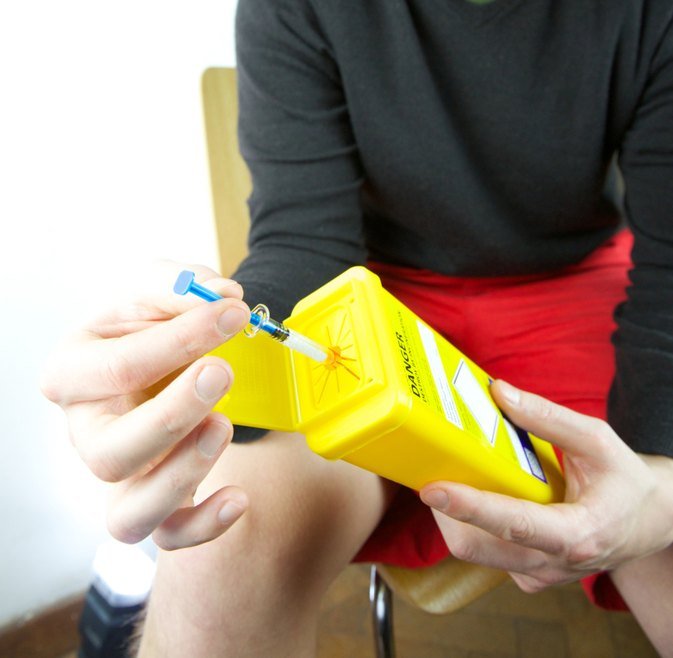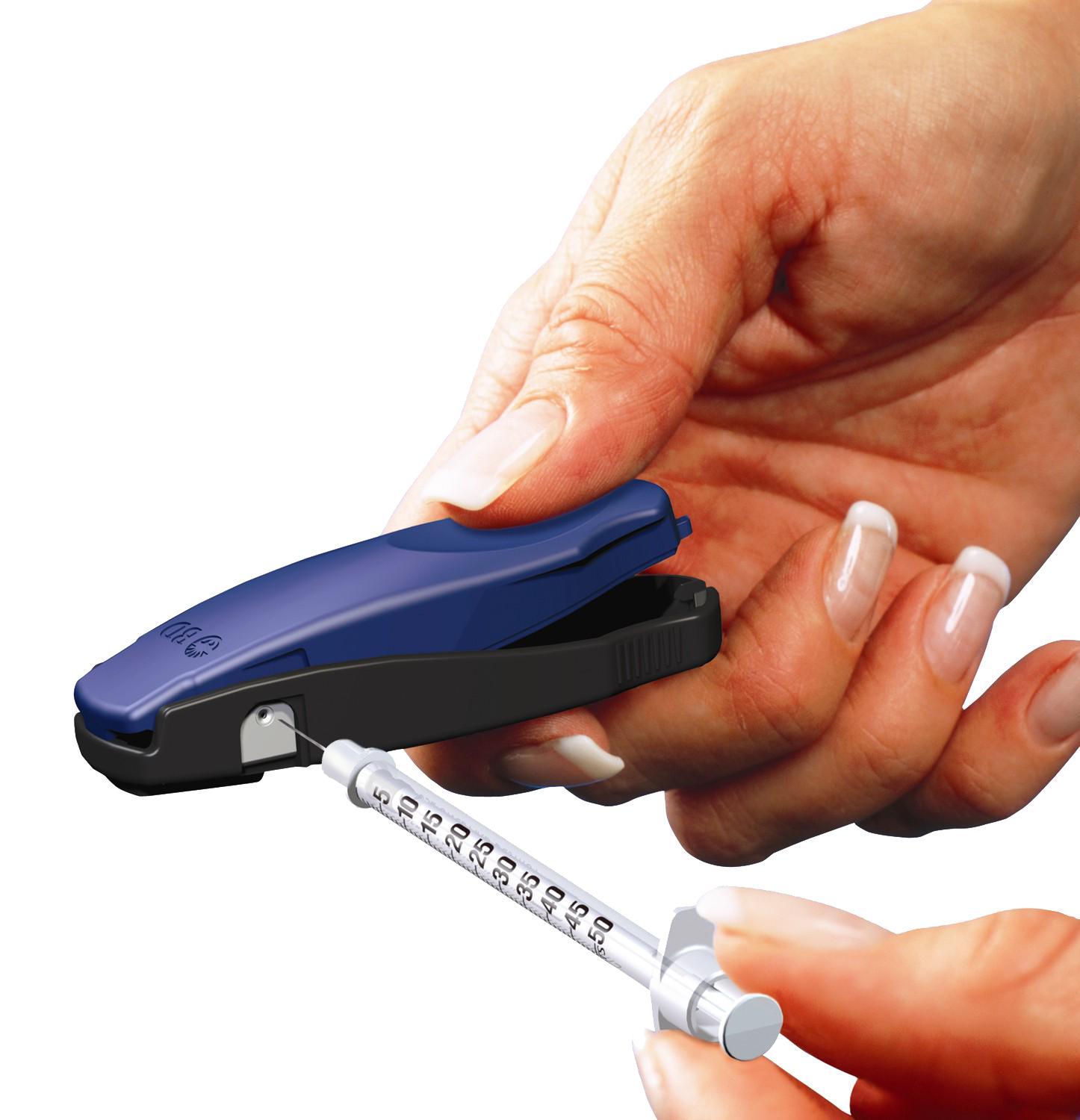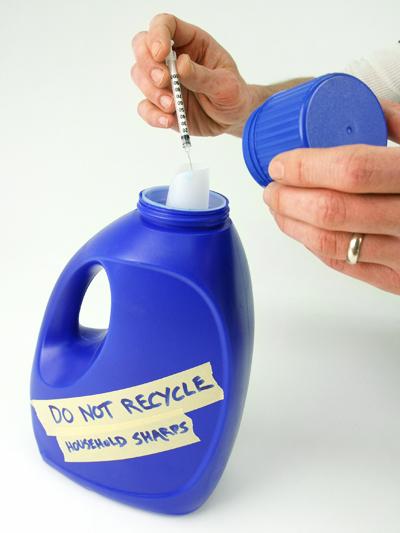Frequently Asked Questions About Sharps Collection Stations
- Who can use sharps collection stations?
-
Anyone, including businesses and institutions, who generates less than 50 pounds of sharps per month, including the weight of the container. However, some stations choose to accept sharps only from certain generators such as their patients, households or residents of a particular community. Call ahead to find out about any restrictions.
- How much does it cost?
-
Many sharps collection stations accept sharps for free. Others may charge some or all users a small fee, which by law must be “not-for-profit” and “cost only.” Some stations only accept containers previously bought at that station. Call ahead to be sure.
- How can I learn;more about a particular sharps collection station?
-
Each station’s contact person is on the list and can answer questions about when a particular station is open, what it charges , who may use it, what kind of containers are accepted and whether replacement containers are provided or may be purchased.
- What if a station on the list no longer exists?
-
If a registered station has moved or no longer collects sharps, ask the owner to notify the DNR of the changes. If the owner is unavailable, contact .
- How can I set up a sharps collection station?
-
Wisconsin medical sharps collection program explains how to set up a collection station and offers examples of collection programs operating in Wisconsin.
Needle Disposal Options And Programs
Several options for disposing of needles outside of a health-care setting exist.
Community-based programs
Community-based programs offer drop-off locations for used needles. Drop-off programs may exist at police stations, fire stations, physicians offices, hospitals, clinics, health departments, or medical waste facilities. An example of a community-based effort is found in New York State, which uses a program available through Chrysalis Environmental Services. This company, which produces products, services, and educational programs to ensure the safe and environmentally friendly disposal of residential medical waste, has established a kiosk program, a joint effort between participating pharmacies or other organizations, and a medical waste hauling company. As part of the program, electronic kiosks, called Zeedles, are placed in facilities to accept residential medical waste. Individuals may dispose of their used needles and syringes in a needle disposal container or into a container a home that they drop it into the kiosk. Additional information about the program is available at
Residential pickup
Residential special waste pick up works well in small communities. Special recycling containers are placed outside the home to be picked up by trained waste workers. This may be done on a regular schedule or as a requested service.
Syringe exchange
Hazardous waste collection
Needle destruction devices
Mail-back programs
Disposing Of Your Medical Sharps
- If you live in New York City, you can place the sealed container in with your regular trash for collection. Dont put it in with your recyclables.
- If you live in a different county of New York or another state, check with your local department of health for instructions.
- You can also bring the sealed container to:
- Your nurse at your next clinic visit
- Any hospital or nursing home in New York State
- A local pharmacy
Also Check: What Happens If You Take Too Much Insulin
How To Dispose Of Expired Or Unused Insulin Vials
Follow these steps for quick and easy yet safe disposal of expired insulin at home. PS. You can follow the steps given below for any other prescription medication or off-the-counter drugs, liquids drops, or even medicated creams.
Additionally, there are some more options you can consider as well. Keeping in mind the ever-growing insulin shortage and availability crisis going on in the country, your unused insulin can be put to good use.
Several doctors stand by the fact that even expired insulin can be used by people with diabetes. It may not be as effective, but its better than not having the hormone at all.
How To Dispose Of Used Lancets And Test Strips

Along with diabetes management comes the responsibility of managing medical waste. Here’s what to do with your used lancets, test strips, and insulin needles.;
Millions of Americans live with lifelong medical conditions that require them to purchase medical supplies and begin a new routine to manage those conditions. Many people may find it challenging to adjust to having a serious medical responsibility added to their already busy schedule.;
Diabetes in particular often requires several medical supplies to manage it well, and it can feel very intensive at first to start testing blood sugar and self-administering insulin shots or taking regular oral medication, paired with learning about the different diabetes supplies involved in self-care.;
Overall, proper disposal of sharps and medical waste is not only a matter of being responsible for your own hazardous materials, but also a matter of doing your part to maintain public health and safety.;
Many people also may be self-conscious or may lack self-confidence in their ability to use a lancet or syringe, which can lead to painful accidents that can even further discourage them from being confident in their own routines.
Also Check: How Many Points Does Metformin Lower Blood Sugar
Needles Used For Illegal Drugs
Reusing a needle to inject illegal drugs carries a high risk of catching a serious blood-borne infection. To avoid the risk of an infection, needles should never be reused or shared.
Many areas in England have needle and syringe programmes that provide free supplies of clean needles and advice on disposing of used needles safely.
Contact your local pharmacy or drug treatment service to find out if there’s a programme in your area.
Safety Precautions For Your Loved Ones
Even if youve taken great precautions in handling the expired insulin and any sharps associated with it, there are still chances of accidents happening.
It would be best if you were prepared if a child, pets, or any other people in the household get struck with your used needles.
Here are the steps to follow if such an incident occurs.
Also Check: What To Do If Blood Sugar Is Over 400
Public Health Risks From Sharps
Medical sharps are often found in household garbage, recyclables or are flushed down the toilet. When these needles end up in the waste stream, they can injure waste haulers, landfill operators and recycling facility workers. When they are flushed down toilets, they may cause problems in plumbing and wastewater treatment plants or may end up on beaches, causing a potential health risk to humans and animals.
All needle stick injuries demand expensive testing, may cause long-term emotional stress and increase the risk of exposure to such infectious diseases as Hepatitis B and HIV from contaminated needles. Costs for a typical needle stick can run upwards of thousands of dollars.
To reduce public health risks, Wisconsin rules require all citizens to manage sharps safely. It is illegal to put sharps in the trash or with recyclables. Sharps must be packaged safely and treated either at a licensed medical waste incinerator or by methods that render the sharps non-infectious, broken and unable to be reused. It is not legal to merely solidify sharps.
Safe Disposal Of Home Sharps
California law prohibits the disposal of sharps waste, including needles, syringes and lancets, in the regular trash. Sharps waste;poses a risk to trash collectors who may accidentally get stuck by a needle, syringe or lancet;and be exposed to a disease.; Your children, pets, housekeepers, and janitors may also be at risk of a needle stick if needles are improperly stored or disposed.;;
- spread serious disease like HIV/AIDS, hepatitis, and tetanus
Sharps should not be:
- placed in recycling containers
Also Check: What Diabetic Medication Can Cause Tardive Dyskinesia
How To Dispose Of Insulin Pens
Diabetes affects nearly half a billion people all over the world. Insulin injections continue to be essential for patients with Type 1 diabetes and are also important therapy for Type 2 patients.
With the introduction of insulin pens, patients no longer have to go through the hassle of using a vial and syringe to inject insulin into their bodies every single day.
These pens contain an insulin filled cartridge, a dial to measure dosage, and a disposable needle. They allow simpler, more accurate, and convenient delivery as compared to using a vial and syringe.
Managing Household Medical Sharps
It is illegal to put needles and other sharp medical items in the trash, recycling or medication collection drop boxes.
Medical sharps, such as needles, syringes and lancets, pose an injury risk for anyone who comes in contact with these items. Large numbers of sharps are used at home, work and on the road. If sharps are put in the trash or recycling or flushed down the toilet, they can injure sanitation workers or cause equipment problems. Therefore, it is important to properly package and dispose of all sharps.;Learn how to properly dispose of used medical sharps below.
Don’t Miss: What Happens If A Non Diabetic Takes Insulin
A Quick Brief On Diabetes
Diabetes is a serious disease affecting a significant proportion of the total American population. It has become relatively common in the United States; as of 2018, 34.2 million Americans live with diabetes–thats 10.5% of the population. Of the 34.2 million adults with diabetes, 26.8 million were diagnosed, and 7.3 million were undiagnosed. Nearly 1.6 million Americans have type 1 diabetes, including about 187,000 children and adolescents.;
One of the primary means of diabetes management is usually self-monitoring and self-administration: regular monitoring of ones blood sugar, paired with oral diabetes medications and/or insulin injections, if necessary. Navigating this new and important responsibility with accurate information is very important for those who may be newly diagnosed with diabetes.;
If this is a condition you or a loved one are facing, it is imperative to take treatment and associated sharps disposal seriously. An important part of this responsibility includes the safe and proper disposal of supplies when youre done using them. Diabetes can be a lifelong condition, and mastering self-management is essential to maintaining a high quality of life and independence.;
Donate To Doctors Or Nearby Health Clinics

Although most health clinics will not accept opened or expired insulin vials, some just might. Most people reject the donations of opened insulin vials as there is uncertainty regarding how it was used and the date it was opened.
However, you should still try to call up clinics and doctors nearby and ask if they would be willing to accept it.
Different clinics have different insulin policies, and if there is an urgent need, they probably will take in your unused insulin.
You May Like: What Kind Of Candy Can A Diabetic Eat
Unused Syringe And Needle Disposal
If this is your first visit, be sure to check out the FAQ by clicking the link above. You may have to register before you can post: click the register link above to proceed. To start viewing messages, select the forum that you want to visit from the selection below. Did your OB-GYN help or hinder your knowledge about Anti-Mullerian Hormone and Follicle Stimulating Hormone ? Take our Survey here ! We’re doing some cleaning and cleaning out and we’ve come across our attractive Gonal F bag full of unused syringes and needles from our ivf days. I know these shouldn’t go into the trash and they’re so old I don’t want to give them to anyone. What’s the best way to dispose of them? Is asking a doctor the only way to get rid of them? Anyone know? Thanks. That would be my suggestion, call your family doctor or gyn, your local hospital might have an answer too. When I got mine the prescribing Dr gave me a Sharps container and instruction on where to take that to when we finished. DH takes his sharp container to his doctor’s office and they dispose of it. When I was working in the ER I took the full container to work to dispose of it. Call you doctor’s office or you might ask your pharmacy? Women are angels…and when someone breaks our wings, we simply continue to fly…on a broomstick.Continue reading >>
How To Dispose Of Sharps
Living with diabetes means that you most likely generate a lot of sharps waste like needles, syringes, and CGM applicators. Thats just part of living with this condition.
So how do you dispose of your sharps safely and easily?
In this post, I will cover what qualifies as sharps and how to dispose of sharps. I will also show you where to find the sharps disposal rules for your state, and how to search for disposal options by zip code .
This post is sponsored by SafeNeedleDisposal.org, a website dedicated to teaching people how to safely dispose of used sharps wherever they are, from patient education nonprofit, NeedyMeds.
Recommended Reading: How Can You Tell If You Have Diabetes
Needles Sharps And Syringes
Diseases such as Hepatitis A and C, and HIV can be transmitted from needle sticks. Needles, sharps and syringes should be safely managed to prevent injury and disease transmission.
- Purchase commercially available sharps container.
- With permanent marker label container, “USED HOUSEHOLD SHARPS – DO NOT RECYCLE”
- Add sharps point-first into container.
- Keep lid on at all times to prevent spills and decrease needle stick hazards.
- Fill container as much as possible with sharps. You must be able to close container lid.
- When full, cap container with lid and duct tape shut.
- Place in trash.
Removing And Disposing Of The Needle
The first step is to remove the needle from the pen and the best way to do this is by using a needle clipper. This device automatically cuts off the needle, making your insulin pen unusable.
The device can hold up to 1500 clipped needles.
You can easily purchase needle clippers from pharmacies and medical supply stores. However, make sure to check that your insulin pen is compatible with the needle clipper before you buy it.
Once the needle clipper is full, it can be disposed of as per the local sharps disposal regulations of your area.
If you are not using a needle clipper, you can also remove the needle manually but first place the needle cap over it so that you dont have to come in direct contact with the needle.
This prevents any accidental needle sticks, cuts, or punctures. Once removed, you cannot throw away the needle in your household trash or public garbage collectors.
Instead, you will need to throw it in a sharps disposal container. These containers are made of strong plastic that cannot be punctured by needles or other sharps.
You can get these from any pharmacy or medical store and even online. They come in a variety of sizes including small travel sizes as well. Once they are full you can follow the local guidelines to dispose them of properly.
An easy alternative to a sharps disposal container is your household detergent or bleach plastic bottle that can be emptied and used for this purpose.
Also Check: How Do You Know If You Are Insulin Resistant
Always Discard With The Pen Cap On
Remember that your insulin pen comes with a needle attached to it. Thats why you should always dispose of your insulin pen with the cap on.
This eliminates any risk of needle exposure to others and prevents accidents.
Please place it in your sharps container, and keep in mind that insulin pens or needles cant be recycled.
Do Not Use Other Bins
Do not put used needles or other sharps in:
- any type of household bin
- a container that’s no longer needed, such as a drinks can or bottle
Needles can cause injuries. Used needles can carry blood-borne viruses that may be passed on to other people.
Viruses that can be passed on through contact with needles include:
You May Like: What Happens If You Have Low Blood Sugar
Whats The Danger Of Throwing Used Sharps And Syringes In The Trash
Firstly, throwing used needles and syringes into the regular trash can pose a risk of accidental sticks and pricks. If this occurs, the victim could be exposed to traces of insulin or other medications as well as bodily fluids, pathogens and other possibly infectious organisms that can cause illness, injury or death. Throwing used sharps, vials and syringes into the trash can also endanger the environment and wildlife.
Disposing Of Needles And Syringes

It is important to manage and dispose of needles, lancets, and syringes safely to prevent injury and disease transmission from needle-sticks. Never leave needles or syringes on streets, in parks, or anywhere else where someone could get injured.
A commercial sharps disposal container from a mailback collection program reduces the risk of a sharps-related accident. It is very durable, clearly labeled, and closes securely.
Don’t Miss: What Are The First Signs Of Diabetes

